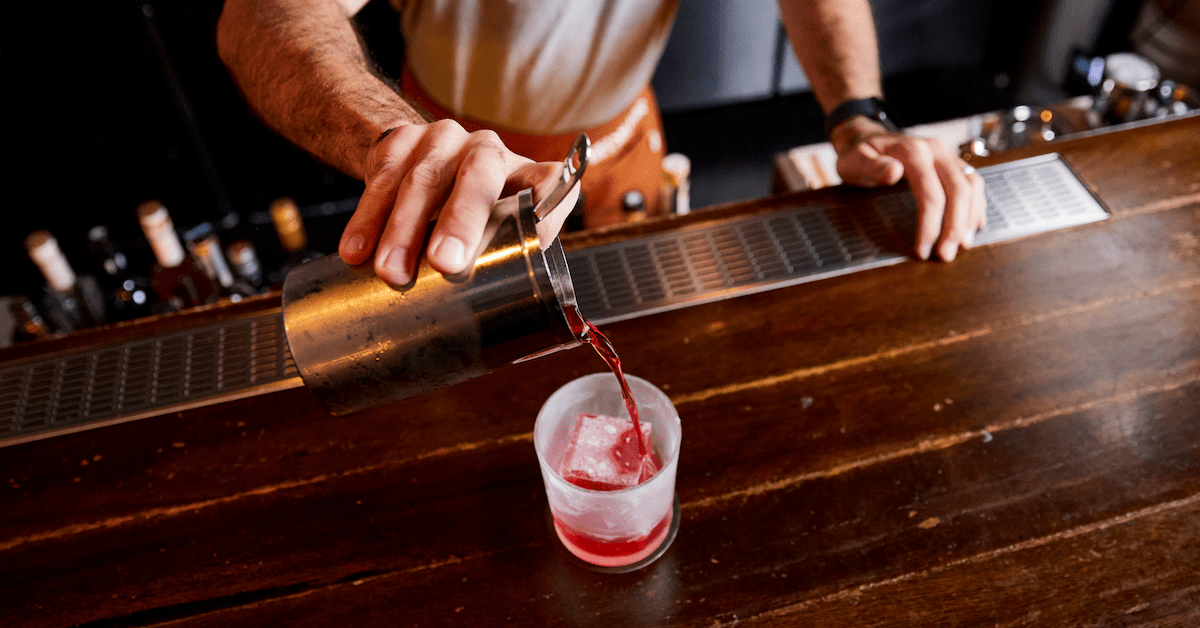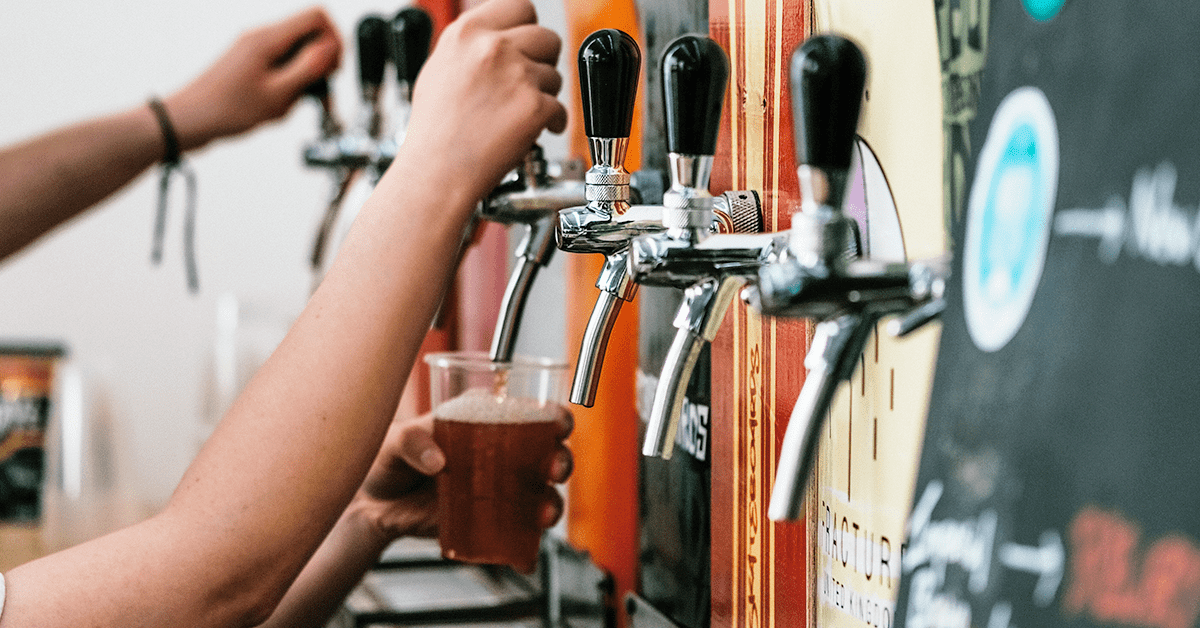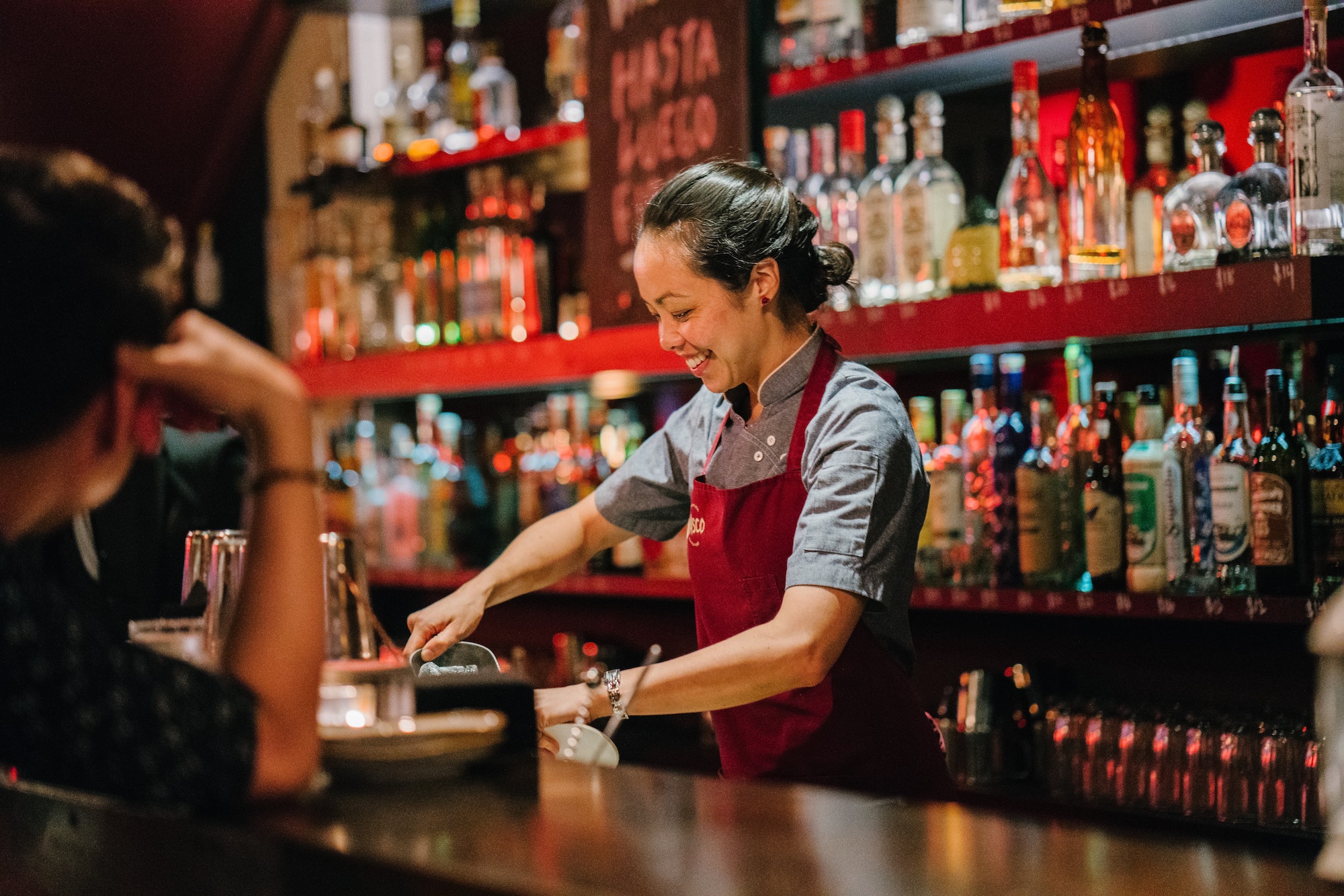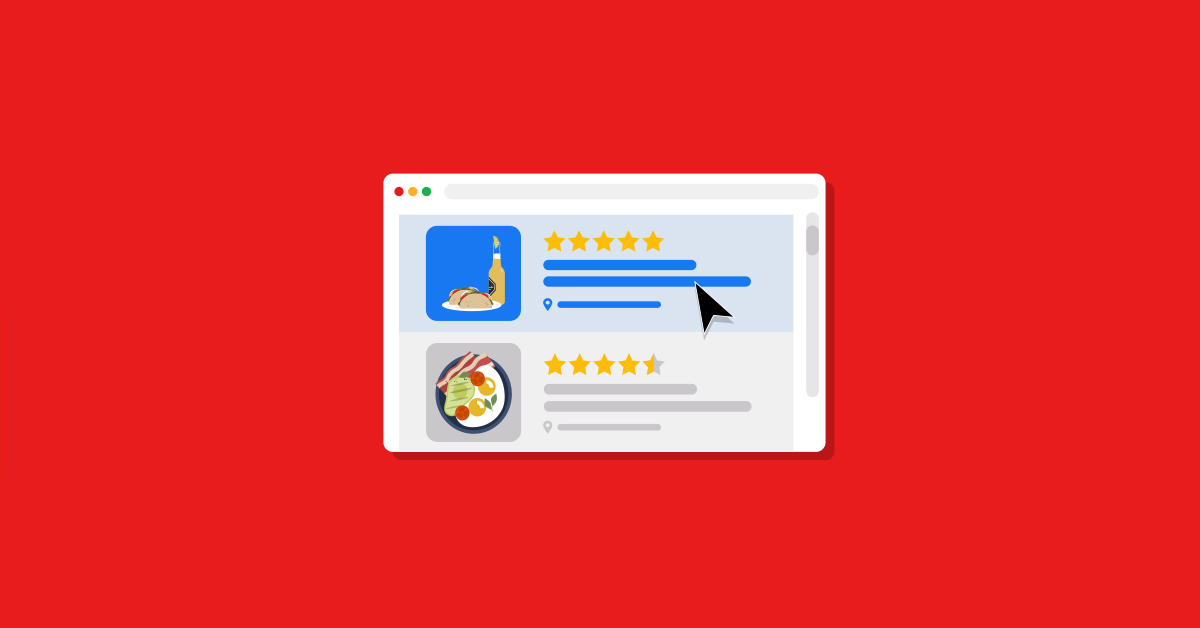
Opening a bar is the pipe dream of many, but if you’re seriously considering taking the plunge and opening your very own bar, then firstly, congratulations! Starting your own business is an exciting and rewarding (if a little nerve-wracking) process, and there’s a lot to consider before you can pour your first drink.
We’ve created the ultimate guide for aspiring bar owners to empower you to take the first steps towards opening your very own bar.
- Concept and business plan
- Cost of opening a bar and funding
- Location and venue
- Licences and certificates
- Menu
- Bar equipment
- Bar technology
- Bar staff recruitment
- Marketing
- Opening day
1. Concept and business plan
Your bar’s concept will provide the foundation for your business and shape your day-to-day operations. It will also determine what drinks you’ll serve, what equipment you’ll need, how many staff members to hire and what your projected startup costs will be.
Concept
When defining your concept, it’s essential to find an angle that no one is using. Customers seek a unique experience, so your new bar must offer something a little different.
The main question your concept needs to answer is: how will customers remember you, and what will make them come back for more?
Take the time to map out how your bar will stand out from the crowd and what will entice people through your doors. Will you brew your own beer, create elaborate cocktails or offer wine tasting experiences, for example. Do you envision a lively wine bar, whiskey den, cosy pub or upmarket cocktail bar?
It’s also important to decide who your ideal customer is and what their values and interests are. This will enable you to map out your service style and tailor everything from your menu to what music you’ll play. It will also inform your marketing strategy, so you know what channels to use to communicate with your customers.
Bar business plan
A detailed business plan is the key to your bar’s success and outlines your vision by detailing how your business will take shape and operate.
Your bar business plan is an essential document, so it’s worth your time and effort to get it right. Once it’s complete, your business plan should be presented to everyone who will help open your bar, from potential investors to bankers and business partners.
Your bar business plan should include:
- Executive summary
- Company overview
- Market analysis
- Marketing plan
- Operations plan
- Financial analysis
Free bar business plan template
This easy-to-use business plan template is designed to help aspiring bar owners set their plans into motion.
2. Cost of opening a bar and funding
It’s estimated that the cost of opening a new bar in Australia can range from $200,000 to $500,000+. While several factors will influence your startup costs, like the size and location of your venue, most new bar owners will need to budget for the following:
- Business lease
- Refurbishment costs
- License fees
- Insurance
- Furniture and equipment
- Lighting and plumbing
Raising such a large amount of capital can be a daunting prospect for aspiring bar owners, but there are several options to help first-time small business owners finance their project.
Tip: use this free government resource to help calculate the startup costs of your business.
Government grants
The federal and state governments regularly create financial assistance packages and initiatives to help new businesses get up and running. Current assistance initiatives include:
- Instant asset write-offs
- Equipment rebates
- Aboriginal business development funding
- New business advice and mentoring
- Assistance for hiring apprentices or unemployed workers
- Subsidies for installing energy-efficient lighting
There are hundreds of government grants available, with new initiatives launched throughout the year, so it’s essential to keep up to date with the most recent support available for your bar in your state or territory.
Bank loans
Bank loans are a popular funding source for first-time small business owners, and the following banks offer several loan options, depending on your exact requirements.
You can also check out the Australian Government’s business advice website to learn more about how to apply for a business loan.

3. Location and venue
Choosing the right location and venue for your new bar is crucial, and you’ll need to ensure both are compatible with your concept and target customer base before signing on the dotted line.
Location
You might have a general idea about which location will be the perfect fit for your bar, but it’s important to conduct thorough research into the neighbourhood and surrounding areas before making your final decision.
Take the time to explore your chosen area to understand if it will be easy to establish your bar within the community and if the surroundings will allow your business to thrive and grow.
When conducting your location analysis, make sure to ask yourself the following questions:
- How regularly does your target demographic frequent the area, and what times of the day are the busiest?
- How much foot traffic passes your front door?
- Are there good links to public transport?
- Are there any time-of-day noise restrictions and delivery truck allowances?
- Are there any development projects or road closures planned nearby?
Remember: your location can make or break your business, and choosing the wrong area can set your business up for a fall before you even open your doors. Therefore it’s crucial to take your time and thoroughly research the area and demographic within it to understand the local dynamics and how your business will fit in.
Venue
Once you have determined a location for your bar, the next step is to find a commercial space to bring your vision to life. When it comes to finding a venue, there are two main options to consider: leasing a space or buying an existing establishment.
Leasing
If you decide that leasing a commercial space is the best option for your bar, you should budget no more than 15% of your yearly income for rent.
Commercial leases are long term, usually a minimum of 5-years, and you’ll need to pay an upfront deposit to secure the space – usually 1 to 3 months rent. You should also budget an additional 6 months rent to ensure you’re covered financially while your bar becomes established.
Tip: don’t forget to negotiate the terms of your lease before you sign. For example, check if water bills are included and if you’re able to make changes to the interior and exterior.
Buying
Purchasing your venue requires significantly more upfront capital than renting, but this option has many advantages if you have the financial means.
For example, if you purchase a venue already equipped for commercial purposes, it will have a kitchen, toilets, running water and an efficient floor plan for serving drinks and making food. This will save time and money in the long run, as many of the costly aspects of setting up a bar have already been accounted for.
To avoid investing in a property that requires significant renovations, consider the following questions when you’re looking for a venue:
- How much space will you devote to your bar area, seating, kitchen, bathrooms and storage?
- How will customers, staff and drinks move through the venue?
- What is the capacity of the venue, and how many tables, chairs, or booths can you fit in the space?
- If you’re going to serve food, is the kitchen space adequate for your production needs, and does it create the best flow for receiving stock, storage, prep, cooking, plating and dishwashing?
- Is there enough space for the equipment you’ll need?
Renovations and decor
Depending on the type of property you secure, you may need to invest in significant renovations, such as structural work, installing a bar and toilets and interior design work to create the space you dreamed of.
On the other hand, your chosen venue may have already housed a commercial business, and a cosmetic upgrade, like fresh paint and new flooring, might be enough to create the aesthetic you’re looking for.
Did you know? In Australia, the average cost of refurbishing a small to medium size bar is between $80,000 to $170,000. For larger bars, this can cost upwards of $250,000.

4. Licences and certificates
Depending on your concept, city and state government, the licences and certificates you’ll need to operate will differ, as will their cost. This process is lengthy and costly, so it’s crucial to get a head start on applications early on in the process.
In most cases, new bars will need the following:
- Business licence – you’ll need to obtain a business license by registering your bar with the local council. Please visit the Australian Business License and Information Service website for more information.
- Council certificates – you’ll need to apply to your local council for several certificates, including, zoning, fire safety, occupation and compliance certificates.
- Liquor license – any venue that sells alcohol will need to obtain a liquor license from the appropriate state or territory government. However, the type of license you’ll need will depend on your business operations.
- Food license – if you plan to sell food at your bar then you’ll need a food licence to legally do so. Licencing requirements vary by state and the size of your venue. Visit your local state government website for more information.
- Music licence – if you plan to play music in your bar, you’ll need a music licence to cover copyright issues.
Remember: depending on your operational requirements, you may need several other licences and certificates, so it’s essential to consult with your local council before opening.
5. Menu
Your menu will be the beating heart of your bar. It should ignite excitement in your guests and keep them coming back, time and again. However, there’s little room for trial or error in the hospitality industry, so it’s crucial to perfect your menu before opening your doors.
To craft the perfect menu, each of the following elements will need careful consideration.
Concept
The first step to building a successful menu is to map out its concept with your bar manager and chef. Will your menu feature organic wines, local beers or classic cocktails? What about your food? Will you offer simple bar snacks or have a more elaborate offering?
Design
An effective menu maintains focus, reduces decision time for guests and, most importantly, drives sales. Your menu also needs to reflect your brand while subtly reinforcing your high-profit drinks.
Prices
Your pricing can make or break your menu. Price your items too high, and you risk alienating a large cohort of customers, price too low, and you’ll cut into your margins. Take the time to research different menu pricing strategies to ensure your price point aligns with your target demographic’s budget and competitors’ pricing.

6. Bar equipment
Aside from leasing or buying your commercial space, purchasing equipment for your new bar will be one of the highest costs you’ll incur.
You’ll need several pieces of equipment to create and serve drinks, store inventory, wash glasses and keep your venue clean. As a starting point, consider the following:
- Cocktail and beverage equipment, e.g. cocktail shakers, spirit measures, blenders.
- Kitchen equipment, e.g. ovens, fridges, toasters, microwaves.
- Workspaces, e.g. preparation tables, countertops.
- Service equipment, e.g. trays, glassware, crockery, utensils.
- Storage, e.g. shelving, bar fridges, containers.
- Inventory, e.g. wine, spirits, beer, fruit juice, garnishes.
7. Bar technology
To operate efficiently and streamline day-to-day operations new bars will need to invest in several pieces of technology.
Point of sale systems
Your bar POS system will be the centre of your business for years to come. Bar POS systems are the key to success for many bar owners as they efficiently manage everything from ordering to payments, inventory and reporting. Therefore, it’s essential to pick a system that aligns with your business goals and can scale with your business as it grows.
Use the following criteria to understand what features your POS will need.
Ordering – your POS system should facilitate several different ordering options, including; QR table ordering, order at the bar and table service.
Payments – your POS should make it easy to split bills, run tabs, accept various payment methods and collect payment at the table.
Inventory – the right POS should manage and track your inventory so you never over or under order, saving you time and money.
Reporting – ensure your chosen POS has a detailed reporting tool. These insights will let you know what you’re doing right and what needs to change, which menu items perform best, which employees sell the most and more.
Accounting – ensure your chosen accounting package integrates with your POS for automatic reconciliation and efficient revenue and expense tracking.
As well as a POS system, there are several pieces of hardware and software that bars can use to automate processes and collect data to optimise their business.
Hardware
- iPads for your point of sale system
- Receipt printer
- Bar/ kitchen printer
- Cash drawer
- Payment terminal
Software
- Point of sale software
- Marketing software
- Employee management
- Delivery and collection services
- Accounting software
Tip: budget at least $1,000 for new hardware and a minimum of $100 per month for software subscriptions.
8. Bar staff recruitment
Your staff will be the key to your bar’s success, and their skills will generate revenue and keep customers coming back. Unfortunately, the staff turnover rate in hospitality is currently 14.3% – higher than any other industry in Australia. Therefore, it’s crucial to invest in finding the right people before you even open your doors.
Don’t rush the recruitment process and take the time to find the best people who will make your business thrive. Once you’ve found your dream team, invest in a thorough training program to ensure your new staff are equipped with the skills and knowledge they need to succeed in their role.
If you invest in finding the right people before you open your doors and provide them with first-class training, then they’re more likely to feel valued, take pride in their work and want to stay working for you.
Remember: all staff members (including yourself) will need to complete essential health and safety training and have a valid RSA before commencing work.

9. Marketing
Marketing is an integral part of cultivating a successful business, yet it’s often forgotten during the hectic run-up to opening a bar.
In today’s digital world, having an online presence for your bar is essential. For many people, your website or social media channels will be the first interaction they’ll have with your business, – it’s where they look when they want to make a reservation, check out your menu, or find out where you’re located.
To ensure your new bar opens with a bang, it’s crucial to utilise as many online channels as possible to drum up excitement for your business within the local community.
Consider the following marketing initiatives to drive awareness for your new venue.
- Bar website – your website should contain all the key information about your bar, such as your menu, contact details, links to social media channels and how to make a reservation.
- Social media – channels like Facebook and Instagram are great for generating free exposure for your bar, so it’s essential to post regularly to cultivate a community of engaged followers.
- Directories and review sites – setting up profiles on sites like TripAdvisor and Yelp is another way to generate exposure for your bar. Ensure your profiles are always up to date with your menu and photos, and always respond to comments and reviews.
- Google My Business – ensure your bar always appears at the top of relevant search results by setting up a Google My Business profile.
- Events and offers – tempt people through your doors with regular events and specials, e.g. happy hours, live music, charity events etc.
Tip: before opening your doors, consider investing in several social media ads to boost awareness in your local area. Both Instagram and Facebook have detailed demographic targeting, so you can easily reach your target audience and promote the grand opening of your new bar.
10. Opening day
The end of the road is finally in sight – you’ve signed the lease, fitted out your space, hired a team and nailed down your marketing plan. It’s now time to welcome guests through your doors and serve your first drink.
Soft opening
Before opening your doors to the public, host a soft opening to test run your menu, workflows and service to iron out any issues. It’s also the first time your team will get to work together (aside from training), so be prepared to give feedback if necessary.
Invite your friends, family, local business owners and suppliers to your soft opening as they’re likely to be more forgiving if mistakes are made.
Tip: host your soft opening a week before your grand opening. If you noticed any issues during your soft opening, this will give you ample time to make any final tweaks to your menu or workflows.
Grand opening
Your grand opening marks the final step in your journey to opening a bar and is the first time you’ll welcome the public through your doors.
On your opening night, you want your bar to be abuzz with excitement, have drinks flowing and (most importantly) a room full of people. Therefore it’s crucial to drum up excitement way before the big day to encourage people to come and try you out.
There’s no denying that your opening night will be exciting, but it can also be stressful – so don’t worry if mistakes happen. It’s very rare for a bar to open without at least one error being made. You’ll have lots of opportunities to learn and optimise your venue, so take the time to enjoy your night and revel in the success of opening your very own bar.
Opening a bar: turn your dream into reality
Deciding to open a bar is exciting, but you’ll need a serious amount of grit and determination to make it past the finish line. No matter if you’re opening a lively wine bar or whisky den, you’ll need to dedicate a lot of time and energy to turn your dream into a reality. We hope this guide inspires you to take the first steps towards opening your own bar and empowers you to make the right decisions to build a successful business.
Free bar business plan template
This easy-to-use business plan template is designed to help aspiring bar owners set their plans into motion.

News you care about. Tips you can use.
Everything your business needs to grow, delivered straight to your inbox.


